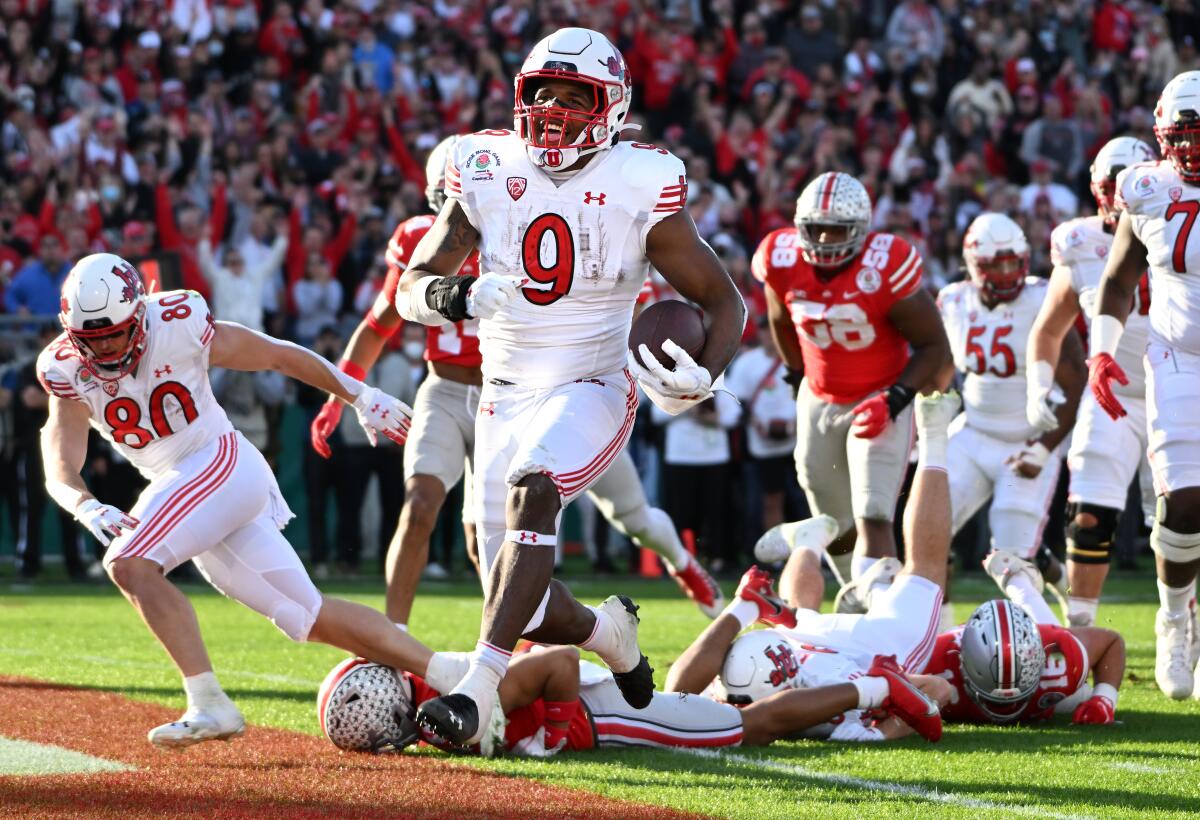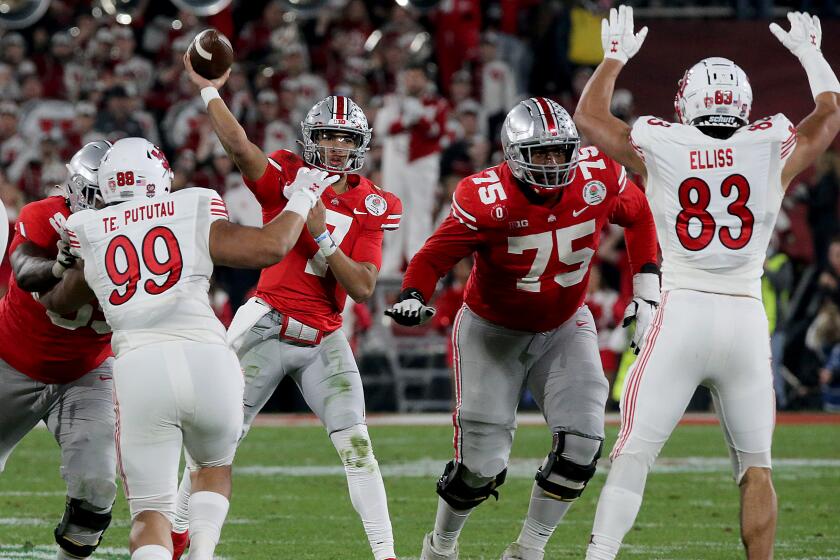Column: Lincoln Riley and USC’s road to national prominence will go through Utah

PASADENA — Before the Rose Bowl was colored red by out-of-state visitors, before Ohio State and Utah furiously exchanged touchdown after touchdown, Lincoln Riley settled into a seat near the northwest end zone on the boomerang-shaped ESPN “College GameDay” set.
USC’s new coach had history in this stadium. Riley coached Oklahoma here in the semifinals of the 2018 College Football Playoff. Two seasons later, his Sooners played UCLA here in a nonconference game.
“Ready to get back,” Riley told a national television audience.
The Rose Bowl game on Saturday didn’t mark the return of tradition as much as it did an introduction to the new normal.
Masks were required in the stadium. The freeways leading to Pasadena were lined with significantly more homeless encampments than there were before the pandemic. And Utah was now the class of the Pac-12.
The Utes dropped a 48-45 decision to Ohio State, but the instant classic of a game elevated them nearly as much as it did the victors. Their performance confirmed that coach Kyle Whittingham’s program will be the primary obstacle for Riley as he looks to return to this stage.
Ohio State’s exciting comeback victory over Utah in a gutsy Rose Bowl thriller showed that college football players do indeed put the game first.
The Utes’ transformation from mid-major darling to the perennial Pac-12 contender is complete. USC’s road back to national prominence goes through Utah, which won its first conference championship after claiming its third South division title in four years.
The Utes were on Saturday what the Trojans could never be under Clay Helton: They were powered by their physicality.
They led the Buckeyes at halftime, 35-21. Utah’s advantage was on the ground, where the Utes outgained their counterparts, 166 yards to 36. The disparity explained why Utah’s time of possession more than doubled Ohio State’s through the first two quarters.
Riley is associated with mobile quarterbacks and speed on the edges but overtaking Utah will require him to reconstruct USC’s lines on both sides of the ball. This could force Riley to evolve, as his teams at Oklahoma were known more for their explosiveness than brute force.
Utah’s run as a Pac-12 power is expected to continue. In his postgame news conference Saturday, Whittingham said 72 of the 85 scholarship players on his roster will return next season as underclassmen.
“Almost in the same boat as this year,” Whittingham said. “Many, many of those guys are playing for us already, particularly on defense.”

The Utes were able to overcome their inexperience in large part because of Whittingham’s effective use of a vehicle Riley has said he could employ: the transfer portal.
Utah’s all-conference quarterback Cameron Rising, who passed for 214 yards and rushed for 92 more before he was knocked out of the game? The Newbury Park High product is a former transfer from Texas.
Running backs Tavion Thomas and T.J. Pledger? They transferred from Cincinnati and Oklahoma, respectively.
Safety Brandon McKinney, who registered four tackles? He came from Washington.
“Can we repeat?” Whittingham said. “I think it’s too early to talk about any of that right now. We do like the level of talent, particularly the young talent on this football team.”
Next year will be Whittingham’s 18th as Utah’s head coach, making Urban Meyer’s former defensive coordinator the longest-tenured coach in a conference that hasn’t won a bowl game since 2019.
A result of the longevity is an established culture.
Ohio State’s exciting comeback victory over Utah in a gutsy Rose Bowl thriller showed that college football players do indeed put the game first.
“I think it starts with the culture that Coach Whit sets and establishes in each and every one of us,” linebacker Devin Lloyd said. “Then from the top down, it’s just a matter of everyone buying in, assistant coaches buying in, players buying in, and it’s really the type of guys they recruit. We have the underdog mindset where we’re never out of it.”
The program’s culture kept the team together in the wake of the deaths of two of its players, running back Ty Jordan and cornerback Aaron Lowe. Jordan died in December 2020 of an accidental self-inflicted gunshot wound; Lowe was shot to death at a house party in September.
The Utes have gained a loyal following, with an overwhelming majority of the 87,842 fans who packed the Rose Bowl sounding as if they were on their side. The atmosphere is something Riley wants to recreate, if not surpass.
Responding to comments made by Ohio State and former Rancho Cucamonga High quarterback CJ Stroud calling the atmosphere at USC and UCLA games “kind of boring,” Riley said, “I think those of us that have followed college football for a long time have a great appreciation for what USC can be, has been, and I firmly believe will be again. When this program is rolling, when its operating at a high level, I really believe there’s none like it in the country. But it’s our job to not just rely on the past, not just rely on the logo. We’ve got to go make it happen right now.”
That starts with overtaking Utah.
More to Read
Go beyond the scoreboard
Get the latest on L.A.'s teams in the daily Sports Report newsletter.
You may occasionally receive promotional content from the Los Angeles Times.








